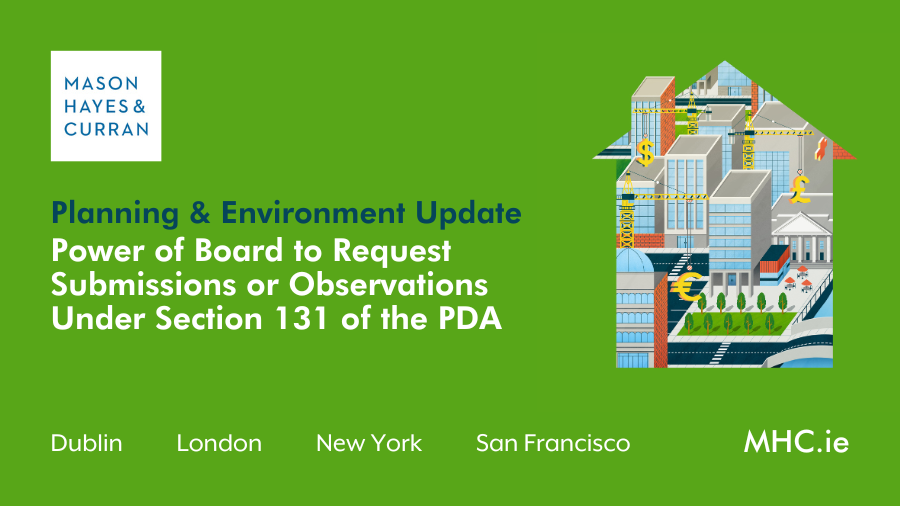Power of Board to Request Submissions or Observations Under Section 131 of the PDA

Background
The Applicant, Keshmore Homes Limited (KHL), challenged the refusal of An Bord Pleanála (the Board) to grant planning permission for a residential development in County Kildare.
KHL applied for planning permission for over 60 residential units in accordance with the Kildare County Development Plan, 2017-2023 (CDP) and the Kildare Town Local Area Plan 2012-2018 (LAP). A variation to the CPD which had major implications for KHL’s proposed development, was adopted while KHL’s appeal was pending before the Board. Prior to this, permission was granted for a separate development, the Rycroft Development. This decision considered the variation and concluded that the proposed development would be in accordance with proper planning and sustainable development of the area even though it materially contravened the CDP.
KHL sought an order quashing the Board’s decision refusing planning permission. KHL challenged the Board’s decision on three grounds:
- Failure by the Board to consider a submission made by KHL in its appeal and failure to provide reasoning for rejection of the submission
- Unfair procedures by the Board, and
- Inconsistency in the Board’s approach to different applications amounting to unfairness
Failure to consider KHL’s submission and/or give reasons for rejecting it
It was contended by KHL that the Board failed to consider KHL’s submission in its appeal that if there was a material contravention of the CDP or the LAP, permission should still be granted. It was further argued, in the alternative, that the Board’s decision to refuse permission was invalid because the Board failed to give reasons for rejecting KHL’s submission.
The Court considered the case of Cicol v. An Bord Pleanála [2008] IEHC 146 and Kenny v. An Bord Pleanala [2020] IEHC 290. In assessing whether the Board was required to provide reasoning for their refusal, the Court looked to Kenny which stated it would be ‘unduly formalistic’ to expect the Board to provide rationale for the refusal. It was apparent from the Board’s decision that the proposed development would contravene the core strategy of the CPD. The dwellings target for Kildare Town was revised from 1527 to 283.
The Court held that having considered the terms in Kenny, read together with Cicol, that there was not a proper basis to justify a material contravention of the CPD. It also determined that there was no further requirement on the Board to state reasons to refuse permission.
Unfair procedures
The claim that fair procedures were not followed arose as the Board did not allow KHL to put forward further submissions regarding the variation before proceeding to refuse the application. The variation had not been adopted when the appeal was lodged and therefore no submissions had been made by KHL on this point.
Under section 131 of the Planning and Development Act 2000, as amended (PDA), the Board has the power to invite further submissions. The Board submitted that the draft variation was made public in January 2020, during which time the public were allowed to make submissions. The Board claimed that KHL had the opportunity to avail of this, meaning fair procedures had been adhered to.
It was argued by the Board that the variation was considered at the time the appeal was lodged by KHL and therefore they were on notice. The Court however remarked that KHL had no reason to presume the variation would be adopted and although on notice that it might be adopted, there was no certainty. Therefore, any submission would have been made on a speculative basis.
Ultimately, the Court was of the view that the change in status of the variation adopted was significant. It was held that the Board breached fair procedures as they did not afford KHL the opportunity to make new submissions on the key variation.
Unfairness arising from inconsistency in the Board’s approach to the variation
KHL submitted that the Board acted capriciously, as the decision did not follow recent case law, namely, Rycroft. The Board maintained that it is imperative to distinguish between the two developments and comparison cannot be drawn between them.
The Court held that although consistency is an important element of quasi-judicial decision making to ensure fairness, it does not set a precedential binding value.
Conclusion
As the adoption of the variation was material to the Board’s decision to refuse the appeal, and since its adoption took place after the appeal had been lodged, fair procedures required that KHL be afforded the opportunity to make submissions as to why it should be granted permission. In this regard, the Court ruled that section 131 of the PDA should have been exercised.
If there is a material change in legislation or policy following the lodgment of submissions, applicants should be afforded the opportunity to make further submissions to the Board in light of this change, as provided under section 131 of the PDA and “in the interests of justice”.
For more information and expert advice, contact a member of our Planning & Environment team.
The content of this article is provided for information purposes only and does not constitute legal or other advice.
Share this:




